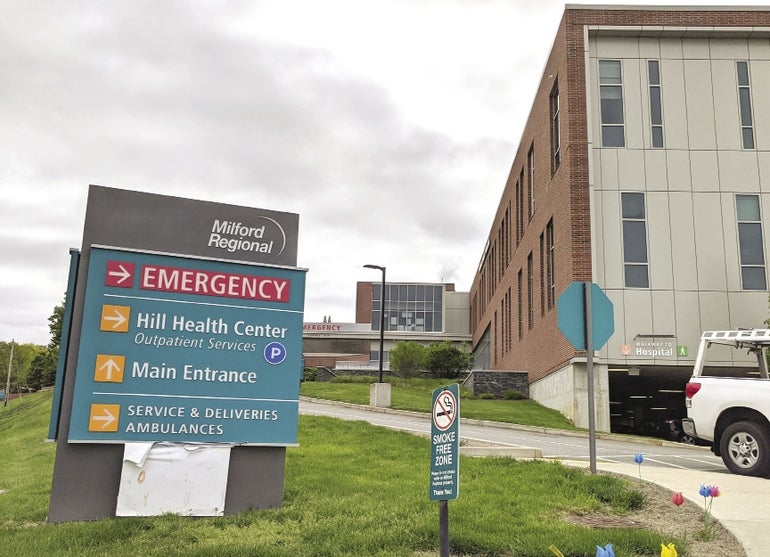Milford Regional Medical Center became the latest hospital to implement a patient code of conduct to reduce workplace violence, a measure becoming more common and one advocates say is crucial to keep nurses at the bedside.
Milford Regional has adopted the code in response to the growing incidence of acts of violence and aggression toward healthcare workers in hospitals across the state and U.S., according to a Jan. 4 press release from the hospital
Examples of behavior not tolerated by hospital standards include offensive comments about personal traits such as race, ethnicity, religion, gender, or sexual orientation; refusal to see a clinician or other personnel based on these personal traits; aggressive or intimidating behavior, including verbal threats; sexual or vulgar words or actions; and disrupting patient care for others.
“Although acts of aggression or violence are an unfortunate reality in today’s healthcare settings, our code of conduct will help reinforce a safe and trusted environment that everyone should continue to expect at Milford Regional,” Dr. Peter Smulowitz, chief medical officer for Milford Regional, said in the press release.
The Massachusetts Health and Hospital Association (MHA) has adopted principles to support such codes of conduct in response to what it says is a growing threat to hospital employees.
In January 2023, the MHA released a report showing a healthcare facility employee was assaulted, verbally abused, or threatened every 38 minutes in 2022, up from every 57 minutes in 2020. The number of peak monthly incidents reported by hospitals climbed from under 700 in 2019 to nearly 1,000 in 2022, according to MHA, which called the escalation an untenable situation.
In October, the MHA filed legislation to address the problem of workplace violence in the healthcare system. An Act Requiring Healthcare Facilities to Develop & Implement Programs to Prevent Workplace Violence, which was referred to the Joint Committee on Public Safety and Homeland Security, includes important changes in addition to requiring workplace safety assessments and plans. Among them are paid leave for victims who address criminal or legal proceedings stemming from workplace violence and making assault against healthcare workers a felony. Special consideration may be given to situations where behavioral health is a factor.
Massachusetts hospitals are on the forefront of tackling the problem, said Pat Noga, vice president of clinical affairs for MHA.
“There is no bigger priority than the protection of the professionals who have committed their lives to helping others,” Noga said in a press release.
MNA seeks a bill with more teeth
The Massachusetts Nurses Association, the union representing more than 23,000 members in the Bay State, says the bill has weaknesses. The MNA has proposed its own version of the bill, an effort it’s been pushing for more than a decade.

The MNA bill includes more accountability and enforcement measures and is more “dynamic,” calling for individualized approach depending on a facility’s setting, whether urban or rural, and ongoing review of safety policies, MNA President Katie Murphy, a nurse for 45 years, said in an interview with WBJ.
The MNA bill addresses the need for what the nurses say are safer nurse-to-patient ratios, which are a major factor in violence against healthcare workers, Murphy said.
“It can’t just sit on the shelf,” Murphy said, of violence prevention plans.
Workplace violence prevention efforts are at least a sign the hospital industry is taking a stand against a longstanding problem that has gotten much worse since the COVID-19 pandemic hit, said Murphy, an intensive care nurse at Brigham and Women’s Hospital in Boston.
Today, hospitals are overloaded and understaffed, leading to disgruntled patients and loved ones, said Murphy. Healthcare workers don’t feel safe, and nurses are leaving the bedside in droves for other jobs. Murphy is hopeful a workplace violence prevention bill may succeed, having almost been passed into law during last year’s legislative session.
“We don’t want any more reasons for people to leave,” Murphy said.

